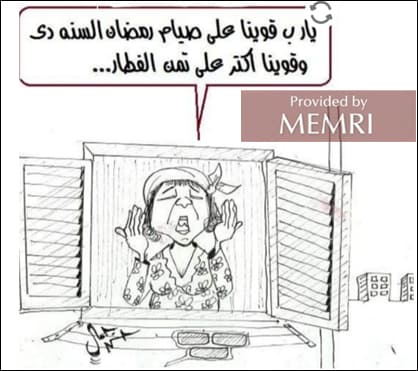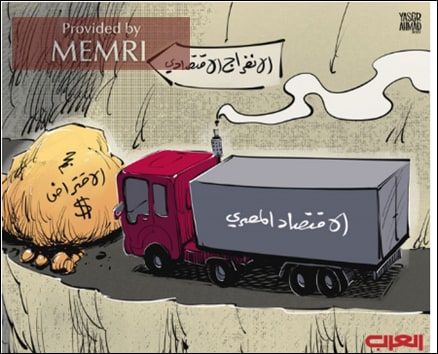In the last two years Egypt has been facing a severe economic crisis, with many Egyptians even unable to afford staple foods. According to figures published by the World Bank, a third of Egypt's population of 104 million lives under the poverty line, and another third is at risk of falling into poverty.[1] The major reasons for the crisis are the impact of the Covid pandemic, the impact of the war in Ukraine, from which Egypt imports most of its grain, and controversial government mega-projects, such as the construction of the new administrative capital, which has cost the state billions of Egyptian pounds.
In the recent months the Egyptian regime, headed by President 'Abd Al-Fattah Al-Sisi, has been compelled to take drastic economic measures as a condition for receiving aid from the International Monetary Fund. These measures include shifting to a flexible exchange rate, which has caused a sharp rise in prices, and minimizing the state's involvement in the economy by selling assets to foreign elements, including the Gulf Cooperation Council (GCC) states.[2] In light of the difficulties caused by these measures, the Egyptian authorities took steps to provide citizens in need with ration cards to buy basic commodities. Thes efforts are aimed at easing the crisis, and apparently also at improving the regime's public image, amid bitter complaints about the crisis and the government's economic policy.
The citizens' frustration and despair over the economic situation also find expression in the Egyptian press. The criticism is voiced mainly in the independent papers, rather than the state press, but even the former refrain from explicitly criticizing the regime and President Al-Sisi, apparently due to censorship restrictions. One of the harsher articles published in the recent months was by 'Essam Kamel, editor of the independent weekly Veto, who slammed the regime's handling of the economic crisis. He argued that, instead of handing out food packages and turning Egypt into a nation of beggars, the regime should supply them with means of production and thereby enable them to provide for themselves and contribute to the country's economy. He added that poverty, which is Egypt's greatest enemy, is the reason for the rising crime rate and for society's moral decline, and may lead to even greater disasters in the future. Another article reflecting the citizens' despair was published in the state daily Al-Ahram by journalist and politician Osama Al-Ghazali Harb. He addressed the plight of Egypt's middle class, which suffers from "supermarket blues" due to its inability to afford many of the products on the supermarket shelves.

Cartoon in independent Egyptian weekly: "God, give us the strength to fast on Ramadan this year, and even more strength [to cope with] the cost of breaking the [daily] fast" (Vetogate.com, March 19, 2023)
The following are excerpts from these two articles:
Editor Of Independent Weekly Veto: Poverty Is More Dangerous Than The Enemy We Confront On The Battlefield; Desperate People Become Ticking Time Bombs
In a March 14, 2023 article titled "When We Become a Nation of Beggars," 'Essam Kamel, editor of the independent Egyptian weekly Veto, warned that the Egyptians' poverty has become insufferable, which could lead to dangerous deeds and to disasters, and called on the government to act before it becomes too late. It should be noted that the article was later removed from the weekly's website, apparently due to its harshness.
Kamel wrote: "In a small Arab country, the authorities decided to tackle the poverty rampant in the rural regions. None of programs that had been proposed managed to efficiently address [the problem], until one minister thought outside the box [in tackling] the crisis of imported milk that was afflicting the country. His [plan] boiled down to a handful of words: 'A buffalo cow for every farmer.' Poor farmers were given buffalo cows for free, on the condition that the price of the cow would later be deducted from the income it yielded. Milk-collecting stations were established in the villages, and half [the income from the milk] produced was deducted, based on the average price of a buffalo cow, while the other half of the income went to the farmer. Within only three years the program came to fruition: the state earned back [its investment] and the farmers were left with a means of production that yielded them profits. The program organizers noticed that many of the farmers already had two or three buffalo cows, not just one. Three years after that, the small Arab country began to export its excess milk, having reached a state of self-sufficiency, and the farmers became [citizens] living in peace and dignity while contributing to the country's economy.
"The people of my country [Egypt] do not need their homes painted with a decorative [trim] or their village [roads] paved in black asphalt with decorated sidewalks. They need means of production! In other words, instead of giving me a fish, teach me to fish or give me a fishing rod, and in time I will catch many fish for myself and for you, and transform from a burden on society into an engine of growth and an economic and cultural asset… The [Egyptian] people need to acquire work skills and means of production.
Poverty will continue to afflict us as long as people remain limited and unable to exercise their desire to work. People, by their very nature, prefer to give rather than receive, and turning the masses into beggars is a disaster by all standards.
"Poverty will remain as it is, or even grow, spread and destabilize [the country], as long as those in charge fail to realize that hunger can cause inconceivable disasters and that dealing with it [requires] developing spheres of employment and production, not in monopolizing everything, even the air we breathe.
"The threat will remain if we continue to believe that handing out cardboard boxes [of food] to the poor will solve the problem. A vacuum begets moral disasters, which already closely [threaten] our streets, neighborhoods and villages… Poverty, in all its diverse kinds and forms, is more dangerous than our traditional enemy, which can be confronted on the battlefield.
"Poverty, gentlemen, is the father of all the disasters we have begun to encounter on a daily basis: the crime rate, the decline of morality and values, and the transformation of the entire nation into [a mass of] beggars.
"True, poverty is a global and [pan-]human problem, but it was never this cruel or this bad. We have reached a state where everyone is living in panic, terror and fear of what is happening on the ground. Society is disintegrating and losing its ability to bear responsibility and cope with the difficulties.
"Homes without nutritional security become time bombs that will devastate everything… Oppressive deprivation and poverty are knocking at every door, but our consecutive governments insist on [handing out food] packages and nothing else.
"The phase of silence is over and the phase of expressing rage in various ways has begun. When life is worth no more than death, people are willing to do anything, without giving a thought to the consequences. Develop the job market,,, and rethink all the spheres that the government has taken control of, which prevents people from finding employment [in them]. Nothing [compares to] employment. Otherwise we will be sorry when it's already too late.[3]

Kamel's article in the Veto weekly
Egyptian Journalist And Politician Writing In State Daily Al-Ahram: Egypt's Middle Class Is Suffering From 'Supermarket Blues'
In an article in the state daily Al-Ahram, Egyptian politician and journalist Osama Al-Ghazali Harb, chairman of the Board of Trustees of the Free Egyptians Party, addressed a term that has recently gained currency in Egypt, namely "supermarket blues": the feeling that afflicts Egyptians when they enter the supermarket and discover they cannot afford many of the products because their prices have gone up. This feeling, he says, is common mainly among the middle class, which constitutes Egypt's political and cultural backbone.
He wrote: "Have you heard the term [supermarket blues]? I recently heard it from a young woman, a friend of my daughter's, and it caught my attention. I asked her what she meant by it, and she replied: 'I mean the feeling I get whenever I go into the supermarket to do my shopping these days! I went on Facebook and saw that some young people were indeed using this term. I read the explanation provided by one of them: 'You go into the supermarket feeling like a prince and come out of it depressed, after paying a lot of money for fewer products. You give up buying many things, because [they are so expensive that they] must be classed as luxuries, or because their price annoys you. You go around mumbling to yourself in anger, etc.' That was a sample of what I read on one website, and since I rarely do the shopping, I went to the supermarket to check the prices. I found that a kilo of spreadable cheese, for example, costs nearly 60 pounds… a 750 ml bottle of oil costs 33 pounds, a kilo of sugar costs 14 pounds… a 1.5-kilo?? pack of butter costs 66 pounds, etc.
"These prices are indeed high, and they constitute a problem and a great burden mainly for the urban middle class. This is certainly not a problem of the wealthy sectors, who live far away in a world of their own. This problem might have [also] affected the poor, who form the largest sector of consumers, but [the poor] do not shop at the supermarket. They buy most of their staples at [designated] supply-stores using [ration] cards issued by the Ministry of Supply. In Egypt [the ministry] issues 23 million [ration] cards to 73 million citizens. So 'supermarket blues' is mainly [a problem of] the urban middle class! And since this class is the political and cultural backbone of society, which essentially shapes public opinion, the fact that this [problem] has reached it is an important matter that deserves serious attention."[4]

Cartoon in Egyptian daily: "Stop, thief! Give back that grain of rice!" (Al-Masri Al-Yawm, Egypt, March 7, 2023)

Cartoon in UAE daily: The Egyptian economy has reached an impasse due to the scope of the loans (Al-Arab, London, February 4, 2023.)




